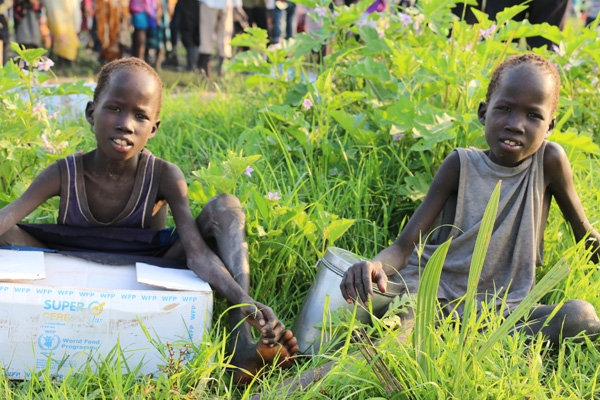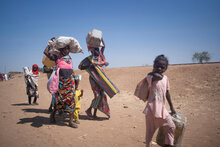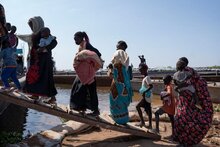Children In South Sudan Cannot Wait For Famine Before World Acts

JUBA, 26 July 2014: The heads of UNICEF and the UN World Food Programme (WFP) today warned that children in South Sudan cannot wait any longer before the world takes action, as they met severely malnourished children and their mothers affected by the conflict in the world's newest country.
“The world should not wait for a famine to be announced while children here are dying each and every day,” said UNICEF Executive Director Anthony Lake, speaking after a visit to the devastated city of Malakal, where tens of thousands of people still take shelter on a UN base. "Today we spoke to mothers who have struggled through conflict, displacement and hunger to stop their children dying. We all have to do more, and quickly, to keep more children alive.”
The UN agency heads said they fear the world is allowing a repeat of what occurred in Somalia and the Horn of Africa just three years ago; when early warnings of extreme hunger and escalating malnutrition went largely unheeded until official famine levels were announced.
"WFP, UNICEF and our partners here on the ground have been working tirelessly to bring assistance to those suffering the consequences of this conflict and we are ready to do more and to reach more," said WFP's Executive Director Ertharin Cousin. "But if we are to rapidly expand our operations and save more lives, then we need more resources, and the international community has to act now."
Nearly 1 million children under five years of age in South Sudan will require treatment for acute malnutrition in 2014, according to UNICEF and WFP. If the world fails to provide the help needed right now to accelerate and scale up life-saving food and nutrition efforts, UNICEF estimates that 50,000 children could die from malnutrition in the course of this year.
Although the conflict is focused in three states of South Sudan, a staggering one in every three people throughout the country – some 3.9 million people - face dangerous levels of food insecurity, with many of them not knowing when and how their next meal is coming.
The unremitting cycle of violence in South Sudan, which has caused the displacement of more than a million people inside the country, over half of them children, has disrupted agricultural activities as well as provision of social services, trading, and the operation of markets, causing massive loss of livelihoods.
Additionally, the lack of access to health care and safe water and sanitation facilities is putting children at a dangerously high risk of acute malnutrition. The situation is compounded by the challenges faced by humanitarian workers in reaching children and families most in need due to the fighting, lack of infrastructure, limited partners and shortages of funding.
Attention broadcasters: Broadcast-quality video B-roll is available. Please contact: Marco Frattini at marco.frattini@wfp.org and Suzanne Mary Beukes at smbeukes@unicef.org
###
For additional information, please contact:
James Elder, UNICEF East and Southern Africa (on mission to South Sudan),
Tel: +211959111100 jelder@unicef.org
Sarah Crowe, UNICEF New York, Tel: +1 646 209 1590; scrowe@unicef.org
Challiss McDonough, Senior Regional Spokeswoman, World Food Programme (WFP), Tel: +254-707-722-104, Email: challiss.mcdonough@wfp.org
George Fominyen, Public Information Officer, WFP South Sudan Tel: + 211 (0) 922465247
Email: george.fominyen@wfp.org


